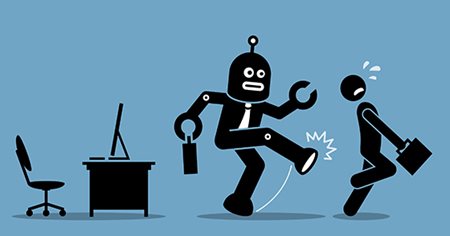Is AI Destined to Take Over the World?
Artificial intelligence is virtually powering every business today in one way or another and according to the research firm Gartner, they projected the value of Global Artificial Intelligence Business will reach $1.2 Trillion in 2018 with customer experience solutions creating the most business value, that’s an increase of 70 percent from the previous year. They also forecasted that AI-derived business value will reach 3.9 Trillion within the next five years.
"AI promises to be the most disruptive class of technologies during the next 10 years due to advances in computational power, volume, velocity and variety of data, as well as advances in deep neural networks (DNNs)," said John-David Lovelock, Research Vice President at Gartner. "One of the biggest aggregate sources for AI-enhanced products and services acquired by organizations between 2017 and 2022 will be niche solutions that address one need very well."
In the report, "Forecast: The Business Value of Artificial Intelligence, Worldwide, 2017-2025," Gartner identifies three sources of AI business value:
- Customer experience (CX): which is "a necessary precondition for widespread adoption of AI technology to both unlock its full potential and enable value;"
- New revenue: from increased sales of existing products and services, and/or new products and services; along with
- Cost Reduction: Reduced costs incurred in the production and delivery of those new or existing products and services.
Customer Experience
For the next few years, the firm expects that the primary source of AI value will come from the customer experience realm, “with the goal of increasing customer growth and retention." Other research has shown this to be true. In a report done by Oracle they estimated that eight out of 10 businesses have already implemented or are planning to adopt AI as a customer service solution by 2020. Previously Gartner research had also predicted that AI bots will power 85% of customer service interactions by 2020.
New Revenue Possibilities
After 2021, Lovelock says AI will be used to “increase sales of existing products and services, as well as to discover opportunities for new products and services” concluding that "in the long run, the business value of AI will be about new revenue possibilities." Salesforce stated that, by 2020, 57% of customers will expect companies to know what they need before they ask for it and Forrester has already estimated that, by 2020, AI insights-driven businesses will steal $1.2 trillion per year from less-informed peers. The future of AI will likely be in new business creation and customer retention through advanced prediction capabilities.
Table 1. Forecast of Global AI-Derived Business Value (Billions of U.S. Dollars)

Source: Gartner (April 2018)
The firm also predicted that decision support/augmentation (such as DNNs) will represent 36% of AI-derived business value in 2018 and 44% by 2022, surpassing all other AI sectors. “DNNs allow organizations to perform data mining and pattern recognition across huge datasets not otherwise readily quantified or classified, creating tools that classify complex inputs that then feed traditional programming systems," said Lovelock. "Such capabilities have a huge impact on the ability of organizations to automate decision and interaction processes."
Virtual agents such as in customer service are a key component of automation. They take over simple tasks and leave the complex ones to the humans, helping organizations reduce labour costs. According to Gartner, virtual agents account for 46% of the global AI-derived business value in 2018 and 26% by 2022, as other AI types mature and contribute to business value. Lovelock said, “One of the biggest aggregate sources for AI-enhanced products and services acquired by enterprises between 2017 and 2022 will be niche solutions that address one need very well. Business executives will drive investment in these products, sourced from thousands of narrowly focused, specialist suppliers with specific AI-enhanced applications.”
We’ve already observed the first signs of AI with regards to the digital economy and targeted advertising. Although this might be simple in comparison to the use cases of tomorrow, it has already driven incredible value for the innovation/ technology community. Just ask the likes of Facebook, Google and Amazon, all of whom have profited off advanced data science, predictive analytics and machine learning.
Automating tasks and optimizing business processes is one which might worry those in the workplace, but organizations which are feeling the pinch of lower profitability, can't see these trends emerge soon enough. This is an area which is potentially very contentious and damaging to society on the whole, as this is when we start talking about redundancies. Tasks like translating voice to text and vice versa, processing handwritten forms, and classifying other rich data content not readily accessible to conventional systems, could make numerous low-skilled workers redundant. Gartner predicts this area of AI could grow to 16% of all business value derived from AI in 2022, up from 2% today.
Although this market sector is expanding fast, these are still early days for AI, in part at least, because the tools are not yet accessible to mid-level coders, Lovelock said. "When we get those tools in place, things will really start moving," he said. “In the early years of AI, customer experience (CX) is the primary source of derived business value, as organizations see value in using AI techniques to improve every customer interaction, with the goal of increasing customer growth and retention. CX is followed closely by cost reduction, as organizations look for ways to use AI to increase process efficiency to improve decision making and automate more tasks," said Lovelock. "However, in 2021, new revenue will become the dominant source, as companies uncover business value in using AI to increase sales of existing products and services, as well as to discover opportunities for new products and services. Thus, in the long run, the business value of AI will be about new revenue possibilities."
Ending Notes
Having recently watched iRobot, the movie takes place in the not so distant future of 2035. The human like robots which are powered by artificial intelligence are mainly used as servants for various public services. Is this what we all have to look forward to? Probably. But what I believe fears people the most is AI becoming so powerful that machines will think they are human or even better than us, sending the human evolution off on an unimaginable path.
I'm personally more optimistic for the human race and believe AI will be a core element in modeling our societies and economies in the future. Helping us cope with large-scale challenges such as creating safer, smarter cities. Artificial intelligence has great potential in industry. It not only relieves workers from having to do repetitive or even dangerous tasks, it is also much faster in analyzing data volumes, making decisions faster and more accurate.

Natalie Evans
Natalie Evans has over 16-years in the tech industry and currently works as the event coordinator and tech reporter for CMS-Connected, keeping up-to-date on what's happening in and around the Content Management industry.